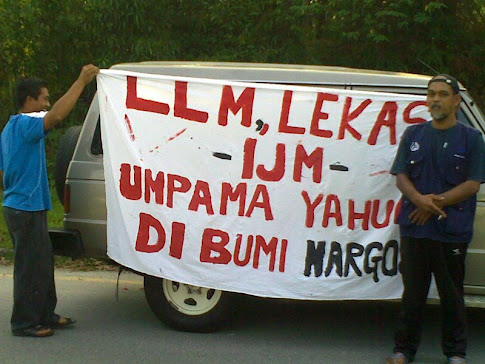3. The guiding philosophy was responsibility of public office. Public office was seen as a duty, not as an opportunity. The public office was also part of their sense of political commitment to create a Malaysia that was fair, just, cohesive, and balanced. This was combined by a deep conviction of generational responsibility for those who would come after them.
4. One of the greatest losses in public life and in politics today in Malaysia is that loss of generational responsibility. Everything seems to be surrounded by greed and the desire to be billionaires. This had led to a pyramid of cronies within the incumbent political parties and their associates in business. It is this combination of the hierarchy of political cronies and business cronies that led to the centralization of power in the incumbent political leadership and in the office of the Prime Minister.
5. This power in one individual allowed the manipulation of the political system; I mean by this the institutions of power including the media. In exchange for the centralization of power greed and self-interest was encouraged by example and in the guise of racial loyalty deserving rewards. This is the case in all the parties within the power structure. This state of affairs is one of the most dangerous and difficult to dismantle because there has been three decades of centralized power.
6. The political style that has dominated in these lost three decades has been "double-think" and "double-talk". One of the features which is alarming in this plan to maintain status quo is the encouragement covertly of racial and religious obscurantism. The underlying theme was a policy of using a balance of racialism and religion on the one hand and talks of unity on the other hand in order to make the people hostage to the status quo of power. As a result, racialism and racial concerns seem to have a grip on all aspects of our lives, in politics, economics, education and employment, irrespective of the present reality which has got nothing to do with race or religion. We are deliberately made to feel that we are hostage to these forces.
7. Freedom of speech and expression of our political concerns to change the atmosphere are restrained by how it will be interpreted by those who want to deny us the right to differ. Article 10 of the Constitution which guarantees this freedom is almost non-existence or subject to fear of retaliation or defamation. Legal suits intended to silence legitimate concerns of public responsibility are increasingly used. Unfortunately, our judicial system has forgotten the fundamental importance of Article 10 to the democratic life of Malaysia. Common sense seems to have been taken out of the law.
8. On the economic front, income inequality in Malaysia has widened. Some studies suggest that Malaysia's inequality is wider than Thailand's or Indonesia's. Historically, the concern was about ownership and control of the economy. It was the view of some that if ownership was de-racialized or balanced at the top, economic justice would follow. It is no longer a valid premise for the future. Income inequality is no longer a problem between races; it crosses the racial divide and it is a problem of the majority of Malaysians who feel the pressure of inflation in almost every essential aspect of their lives, challenging their wellbeing of themselves, their families, and their future. Today and the in the near future, this is the most serious challenge we face. It is not an easy challenge to overcome. It is a time when Malaysia needs leadership of the highest quality and of those who have the moral courage to change and re-think our economic policies.
9. It is in these circumstances that we face the serious problem of rising food prices, inflation in price of houses compounded by shortage in housing for the vast majority of young Malaysians. Lack of economic expansion to give all levels an opportunity to use their talents to seek work that is commensurate with their contribution, their needs of daily life, and to narrow the inequality gap, is the threat of the future. Therefore, we should be concerned about the justification of the removal of subsidies that affects the low income because that will further widen the inequality and open the society to social disorder and disintegration, and increase social in cohesion. It is in this context that I raise the issue about Independent Power Production Companies (IPP). The privatization contracts are today protected by the Official Secrets Act, and therefore we are unable to really know whether or not the public and PETRONAS, as trustees of the public, are directly or indirectly subsidizing these companies and the tycoons who are benefitting at the expense of the public.


